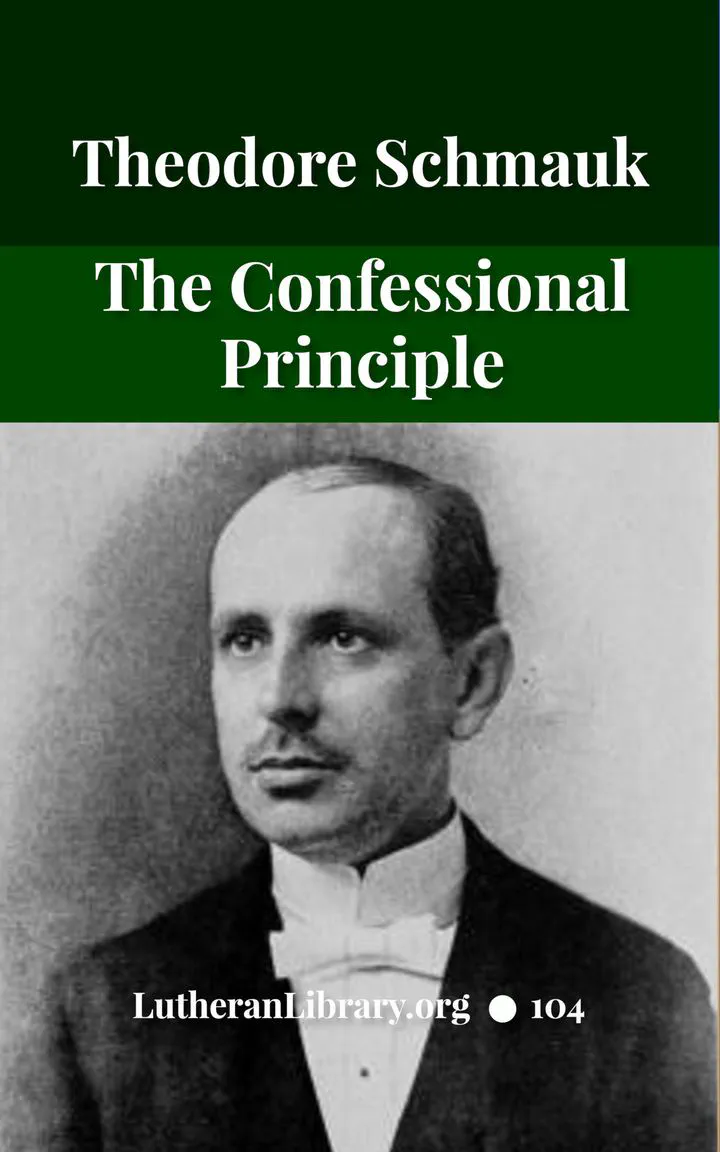The Confessional Principle by Theodore E. Schmauk

Theodore Schmauk’s exploration and defense of the Christian faith consists of five parts:
- Historical Introduction
- Part 1: Are Confessions Necessary?
- Part 2: Confessions in the Church
- Part 3: Lutheran Confessions
- Part 4: The Church in America
“This book is written in the belief that the one ultimate authority among men is truth.” — Theodore Schmauk
Theodore Emanuel Schmauk, D.D., LL.D. (1860-1920) was one of the foremost theologians in American Lutheranism. He was editor of the Lutheran Church Review, president of the General Council and of the Board of Directors of the Lutheran Seminary at Philadelphia.
Level of Difficulty: Intermediate: Some subject matter knowledge helpful.
Book Contents
Section I. Historical Introduction
Section II. The Christian Confessional Principle
- 1 The Question of a Confessional Foundation: What is the Question?
- 2 How Is The Question To Be Discussed?
- 3 What Are Confessions? Definitions
- 4 Does The Church Need Confessions?
- 5 Do Confessions Constrict, Or Do They Conserve?
- 6 Should Confessions Condemn and exclude?
- 7 What Gives The Confession Validity?
- 8 Do Confessions Bind?
Section III. Its History and Development in Christianity
- 9 The Rise of the Confessional Principle in the Church
- 10 The Development of The Confessional Principle in The Church
- 11 The Confessional Principle In The Augsburg Confession
- 12 The History and Tendency of The Confessional Principle in The Church
- 13 The Confessional Use of The Word “Symbol”
Section IV. The Lutheran Confessional Principle.
- 14 The Lutheran Confession
- 15 The Origin of the Augsburg Confession. Kolde’s Introduction
- 16 Melanchthon’s Unsuccessful Attempts as a Diplomatist. Kolde’s Essay
- 17 Kolde on the First Known Draft, or Oldest Redaction of the Augsburg Confession, and its Discovery
- 18 The Oldest Redaction of The Augsburg Confession
- 19 The Hand of God in the Formation of the Augsburg Confession, as shown by the Course of Events in 1529 and 1530, and in the Letters of Luther, and of Melanchthon
- 20 The Augsburg Confession Remained Unaltered
- 21 The Augsburg Confession: The Further History of its Editions and Manuscripts. Kolde’s Essay, With A Summary of the Argument as it Bears on the Confessional Question, by T. E. Schmauk
- 22 Protestantism Under The Augsburg Confession To The Death of Luther
- 23 Protestantism From The Death of Luther To The Death of Melanchthon and to the Disintegration of Lutheranism
- 24 Melanchthon and The Melanchthonian Principle
- 25 The Need of A Concordia Realized, and its Origin Attempted
- 26 The Formula of Concord: its Origin Based on Kolde’s Introduction and on the Formula in Hauck
- 27 The Introduction of The Concordia, and The Augustana Preserved
- 28 Is The Formula of Concord A Confession?
- 29 The Answer of a Providential Origin to the Question - Is the Formula a Confession?
- 30 The Answer To The Criticism Made On The Motives and Men, as Touching The Question, Is The Formula A Confession?
- 31 The Answer of The Formula’s Outer Form to The Question, Is The Formula A Confession?
- 32 The Answer of The Formula’s Subject Matter, Touching The Question, Is The Formula of Concord a Confession?
- 33 The Person of Christ and The Formula of Concord
- 34 Concordia Is The Church’s Great Confession of Christ
- 35 What The Formula of Concord Accomplished As A Confession of The Lutheran Church
- 36 The Book of Concord. The Facts of its Origin and Publication. Kolde’s Essay
Section V. In America
- 37 From the Book of Concord to the Present Day
- 38 The Book of Concord and Historical Lutheranism In America
- 39 The Confessional Principle of The Book of Concord and American Protestantism
- 40 The Confessional Principle of The Book of Concord and Christian Cooperation
- 41 The Confessional Principle of The Book of Concord and The Brotherhood of The Christian Church
- 42 The Confessional Principle of The Book of Concord and the Future of the Church In America
“Ten Thousand Questions”
“The Bible raises ten thousand questions. If you answer any one of them in your own way only, and without looking farther, and say, ‘This is what I believe,’ you are setting up a personal creed of your own. If you simply content yourself with the assertion, ‘The Bible is my creed,’ you are leaving unanswered many of the most important and vital questions of faith and life. And a Church’s answer, more than your own, must be ample to meet all questions.” — Theodore Schmauk
Publication Information
- Lutheran Library edition first published: 2019
- Updated: v6.2021-04-07
- Copyright: CC BY 4.0